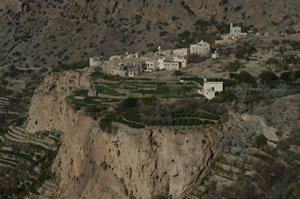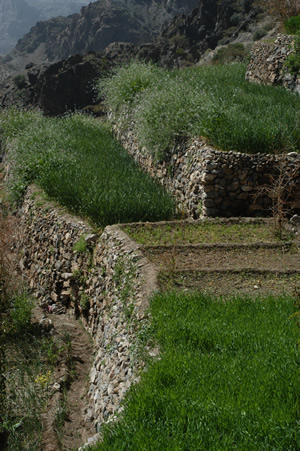From a perspective view
our study group got introduced into the oases systems of the Jabal al
Ahkdar mountains. The oases are located in a gorge at an elevation gradient
from 1.000 – 2.000 meter above sea level. The Ash Sharayjah oasis
is located at 1.900 masl with 18 households and an approximate size of
15-20 family members. Through agricultural producing the families reach
30-50% of their income. More and more benefit from off-farm income in
the cities.
Small scale farming is practiced on terraces which are smaller than 1ha
and supplied with water from the Falaj system. Through mixed crop farming
the Omani cultivate nearly year around food for home consumption or fodder
for their livestock: goats, cows, chicken and sheep.
Fruit trees like pomegranates, lime, almonds, walnuts, peaches and apricots
characterise the terraces of Ash Sharayjah. Late March the Rosa damascena
turns the terraces into blooming and fragrant gardens. Before sunrise
the Omani women pick the rose flowers while the privileged work of the
Omani men is to distillate the rose fragrant and produce rosewater and
rose oil. Not only the rose products but also the valuable pomegranates
are well known by the Omani people.
Living and cultivating in the oases are since generations well established
in a coarse environment. Due to socio economic and environmental changes
the unique and vulnerable agricultural systems change.
Traditional forms
of life in the mountains are increasingly replaced by contemporaneous
patterns, for example people are decreasingly willing to do the hard work
of agriculture in the mountains and prefer jobs in the tourism sector.
In the course of this development, traditional knowledge is also about
being lost.
To read more, please download the reports by Anne Hoffmann and by Rico Ihle.
Continue to "Visit of an Oilfield".

